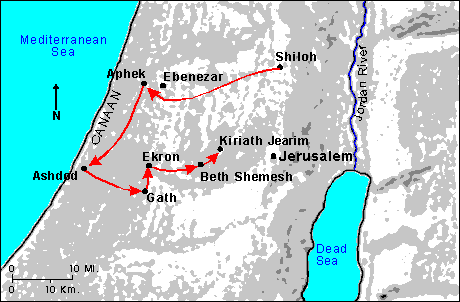Verse 2:[1] And the Philistines put themselves in array against Israel: and when they joined battle (Heb. the battle was spread[2]), Israel was smitten before the Philistines: and they slew of the army (Heb. the array[3]) in the field about four thousand men.

[And they set in order the battle line (thus the Syriac, Arabic, Munster, Pagnine, Tigurinus), וַיַּעַרְכוּ] And they set in order. To set in order is put absolutely in the place of to set in order the battle line, or the battle. Thus ponere, to set, in the place of ponere castra, to set camp; which the poet expressed by tendere, to pitch, …here savage Achilles was pitching[4] (Drusius). They set themselves in order (Montanus). They set the battle, or fight, in order (Jonathan in Drusius). Παρατάσσονται εἰς πόλεμον, they are ordered for war (Septuagint).
[Now, with the contest begun, וַתִּטֹּשׁ֙ הַמִּלְחָמָ֔ה[5]] They render it variously. When the battle was joined (Junius and Tremellius). Hebrew: was extended, or unfolded (Junius, Piscator, Drusius). And with the battle begun (Munster, similarly the Syriac, Arabic). And the battle was spread (expanded itself [Pagnine], unfolded, or widened, or spread itself [Vatablus], inclined [Septuagint]) (Montanus, that is, the soldiers began to spread themselves (Vatablus). Thus it is wont to happen, when battle lines meet (Drusius). When the soldiers had begun to spread and to unfold themselves (Tigurinus Notes). That is, they began, not to do battle, but to be spread out for battle. Whence it is gathered that there was a marvelous faintheartedness in the Hebrews, who, as it were, prepared flight before the fight. That [original] daring [of the Israelites] to fight failed, after this liberty of living became established. God alarmed them with His terror (Mendoza). Others: and the fight was extended; that is it was fought far and wide (Osiander, certain interpreters in Malvenda). The battled was extended, that is, it continued a long time, and it was waged all day and more (others in Malvenda).

When they joined battle; Hebrew, when the battle was spread, that is, when the two armies had drawn forth themselves into military order, and put themselves into the usual posture for fighting, and began to fight in their several places.
[And Israel turned its back, וַיִּנָּגֶף] And Israel was cut down, or smitten (Pagnine, Vatablus). It was afflicted with a stroke (Junius and Tremellius).
[And there were slain in that contest, בַמַּֽעֲרָכָה֙ בַּשָּׂדֶ֔ה]In the battle line (order [Montanus]) in the field (Septuagint, Jonathan, Syriac, Pagnine), or along the plain (Munster, Tigurinus).In that very conflict, in the same field (Junius and Tremellius), or, in that field (Piscator).In the formation of the battle lines, etc., from עָרַךְ, to form a battle line (Drusius).In the war, when the battle lines were formed (Arabic).More correctly, of the battle line, which had been formed in the field (Osiander).
[1] Hebrew: וַיַּעַרְכ֙וּ פְלִשְׁתִּ֜ים לִקְרַ֣את יִשְׂרָאֵ֗ל וַתִּטֹּשׁ֙ הַמִּלְחָמָ֔ה וַיִּנָּ֥גֶף יִשְׂרָאֵ֖ל לִפְנֵ֣י פְלִשְׁתִּ֑ים וַיַּכּ֤וּ בַמַּֽעֲרָכָה֙ בַּשָּׂדֶ֔ה כְּאַרְבַּ֥עַת אֲלָפִ֖ים אִֽישׁ׃ [2] Hebrew: וַתִּטֹּשׁ֙ הַמִּלְחָמָ֔ה. [3] Hebrew: בַמַּעֲרָכָה. [4] Æneid 2:29. [5] נָטַשׁ signifies to leave, or to permit; perhaps even to extend.